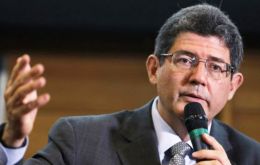MercoPress. South Atlantic News Agency
Tag: Brazil’s GDP
-
Thursday, July 23rd 2015 - 08:02 UTC
Brazil slashes fiscal savings' goals for 2015 and 2016 on plunging tax revenue

Brazil dramatically lowered its fiscal savings goals for 2015 and 2016 on Wednesday due to plunging tax revenues, and announced new spending cuts to underscore its commitment to austerity. The government cut its primary surplus goal for this year to 8.7 billion reais ($2.70 billion), or 0.15% of GDP, from 66.3 billion reais, the equivalent of 1.1% of GDP, originally budgeted.
-
Monday, July 20th 2015 - 07:30 UTC
Brazil's Levy warns that relaxing spending cuts will only extend the pain

Brazil's Finance minister Joaquim Levy warned that any attempt to relax spending-reduction goals for this year would inevitably extend the duration of the current fiscal adjustment program. The statement was made on Sunday in a long interview with one of Brazil's leading dailies, Folha de Sao Paulo.
-
Saturday, May 16th 2015 - 07:46 UTC
Levy tries to convince investors in London that Brazil slowdown is temporary

Brazilian Finance Minister Joaquim Levy said he expected the country’s economic slowdown to be temporary and that fiscal discipline remained central to ensuring the recovery as a commodity price boom waned. Addressing investors in London, Levy said fiscal discipline was needed to cushion the economy against the inflationary effects of the falling Real currency.
-
Tuesday, April 28th 2015 - 05:44 UTC
Brazil's economy expected to further contract and inflation to reach 8.25%

Analysts have reviewed negatively Brazil's 2015 inflation and growth forecasts, according to the latest Focus report from the Central Bank, released on Monday. The survey which includes 100 analysts from private financial institutions on the state of the economy anticipates inflation of 8.25% and 1.1% contraction of GDP by the end of the year.
-
Monday, April 6th 2015 - 16:56 UTC
Brazilian economy to contract 2% this year, and inflation 9% predicts French bank

BNP Paribas said in Sao Paulo that it expects Brazil's gross domestic product to shrink 2% this year, or double the contraction the French financial services company had projected one quarter ago.
-
Wednesday, January 14th 2015 - 09:19 UTC
Brazil anticipates 'program of targeted tax increases' and 'fare realism' for power and fuel

Brazil's finance minister said on Tuesday a program of targeted tax increases was designed with the intention to not harm fragile growth in Latin America's largest economy. Joaquim Levy also pledged 'fare realism' for electricity bills and fuel prices based on 'business reasons'.
-
Monday, October 21st 2013 - 07:39 UTC
Brazil's development bank to target infrastructure and less on corporations

Brazil will inject less money next year into the country's development bank BNDES, (National economic and social development bank), its leading source of long-term corporate loans, to focus more on infrastructure financing as concerns mount over public debt.
-
Monday, December 17th 2012 - 21:15 UTC
Brazil and Argentina bottom of the list in terms of competitiveness

Brazil ranks near the bottom among fourteen emerging powers in terms of competitiveness, due to high capital and labor costs as well as inadequate infrastructure, according to a study commissioned by the National Confederation of Industry (CNI) and published by the Folha de Sao Paulo daily.
-
Tuesday, December 6th 2011 - 20:20 UTC
Brazil slowdown faster than expected: negative growth in the third quarter

Brazil’s economy shrank in the third quarter, prompting the government to slash its growth forecast for the year, one week after announcing stimulus measures to contain the spillover from Europe’s debt crisis.
-
Friday, November 18th 2011 - 06:30 UTC
Brazil economic activity falls 0.32% in the third quarter

Brazilian economic activity dipped in the third quarter despite a slight rise in September, according to central bank data on Thursday. The central bank's IBC-Br economic activity index fell 0.32% in the third quarter.
